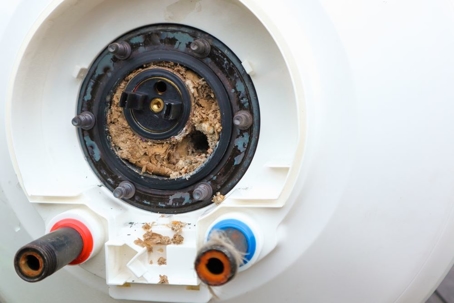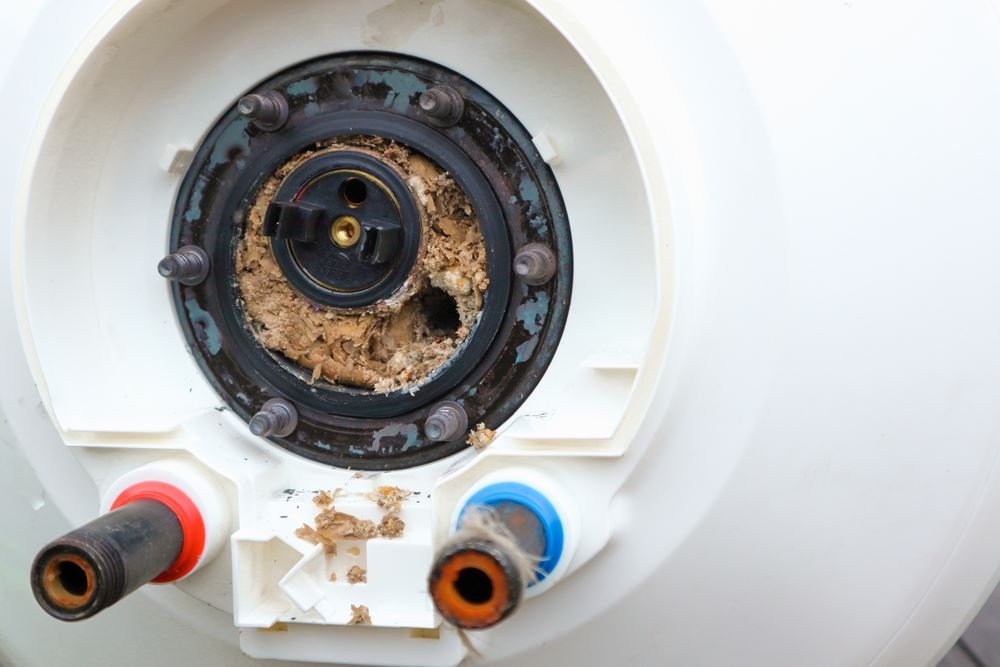Think about the word “flush.”
You can be flushed with excitement, your face glowing pink from the blood rush and the adrenaline.
Bird hunters “flush” the flock out from their ground cover.
Police officers “flush” criminals out from behind the cover of disguise and deception.
Health-conscious individuals “flush” the toxins from their bodies by fasting and drinking lots of water.
We all know about flushing the toilet.
But do you know that you should be flushing your water heater too?
Does your water heater need a good flush right now?
Yes.
Here’s why.
Sediment Is Unavoidable
All water has sediment.
Sediment is any solid material that settles to the bottom of a liquid.
Your home's water supply probably is pulled from surface or ground water like a lake, reservoir, stream, spring, or river. Water from all those sources rubs against dirt, sand, and plants. So when water is pulled from those sources, it’s impossible not to get a speck of sand, a fleck of dirt, or a little bit of plant matter in the water.
Once the water is pulled from its source, it then runs through pipes. If your home or your city has older pipes, small particles of metal, rust, and minerals that flake off of those old pipes can also be distributed into the water.
Those little particles in the water are called sediment.
Inside your water heater, those tiny particles come in with the water and then settle to the bottom around the heating element. In time, sediment builds up causing problems in your water heater.
Problems Caused by Sediment
If sediment builds up at the bottom of your water heater, it insulates the heating element, making it harder for your unit to heat the water in the tank. The heat that needs to go into the cold water can’t get through a thick buffer of sediment.
Your unit must work much harder to bring your water to the desired temperature. This means that the element is more likely to burn out and that the water heater is no longer working at top efficiency, costing you more money on utility bills.
It also means that the lifespan of your water heater is decreasing because of the wear and tear it’s facing.
Not only does sediment cause trouble INSIDE the water heater, it can cause problems outside the unit, too. When you have lots of sediment in your water heater, those particles can be pushed out with the heated water, traveling to other plumbing fixtures and clogging shower heads and faucets.
Scaling is a problem, too
If the sediment in your tank includes bits of metal, or if your water has a mineral content high in calcium and magnesium, (known as “hard” water,) the minerals interact with the water and form a chemical reaction known as “scaling.”
Scaling is corrosion that results in a hard layer that covers a surface.
If your heating element gets covered with scale, it can burn out. If the inside of your tank suffers from scaling, it can become warped and cause leaks. Worse yet, scaling and corrosion
Musical scales, fish scales, and weight scales are good things. Chemical scales inside your water heater are not.
“Hard” water can decrease the life expectancy of a water heater by two or more years.
A simple way to stop sediment buildup and scaling problems
Don’t you love it when there’s a very simple way to stop significant problems before they happen?
It’s so simple.
Have your water heater flushed at least once per year.
If you have “hard” water with high calcium or magnesium content, have your water heater flushed TWICE per year.
What is a water heater flush?
Flushing a water heater is similar to flushing a toilet.
Basically, you’re getting rid of all the dirty water, rinsing and flushing any remaining debris, and then refilling the tank with clean water. In the case of the water heater, you have to reheat the water.
Flushing a toilet just requires pushing a button or flicking a lever.
Flushing a water heater is a different process.
Does your water heater need a good flush right now?
Probably.
Unless you know that
- you just had it flushed…
- you perform this necessary, routine maintenance every January without fail…
- you belong to a plumbing maintenance program…
…your water heater probably needs a good flush right now!
When was your water heater last flushed?
Can you flush a water heater yourself?
The answer is “yes,” you can, but only if you have the time, energy, determination, knowledge, and physical ability to do it yourself. Hardware stores sell plumbing kits for flushing your hot water heater which you can buy, read the directions on, and attempt on your own.
But why?
ServiceOne can do the job quickly, easily, and affordably.
Call us, and feel the flush of excitement for a great deal!


